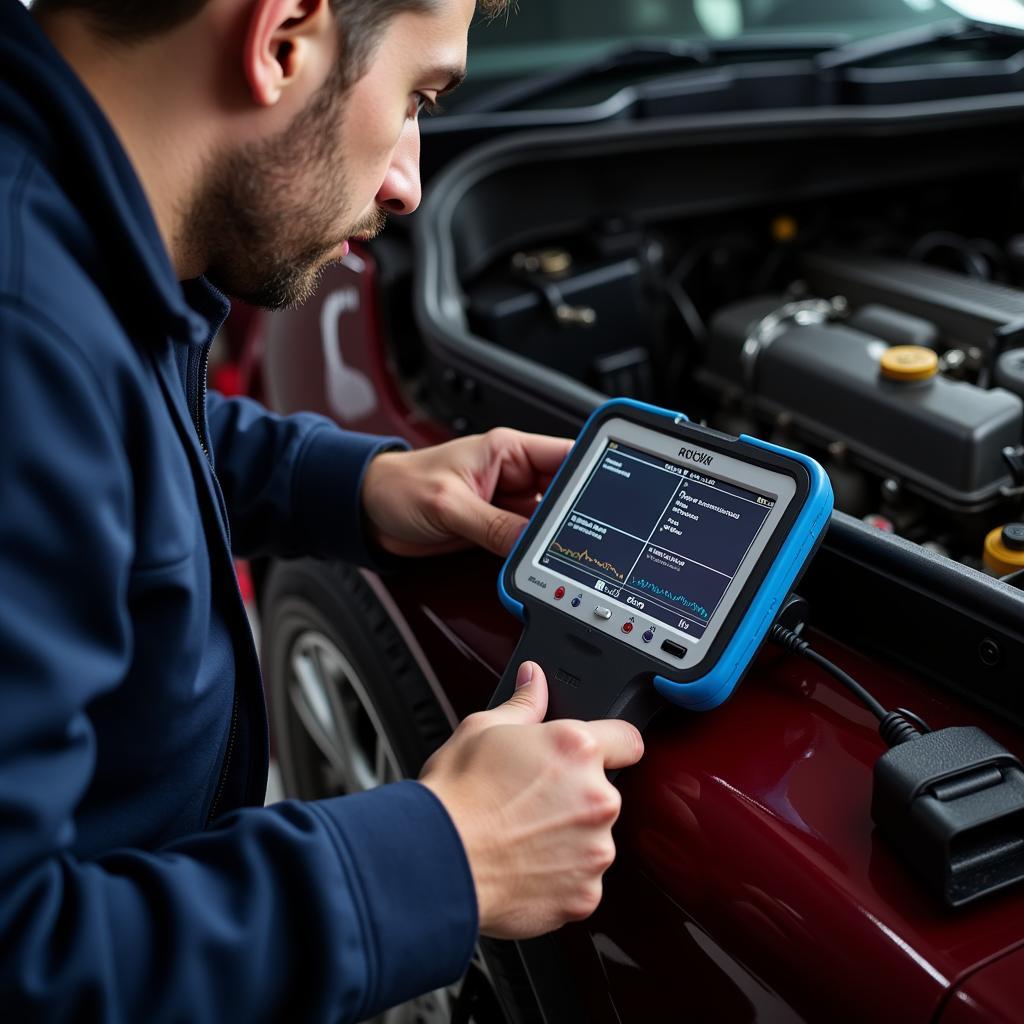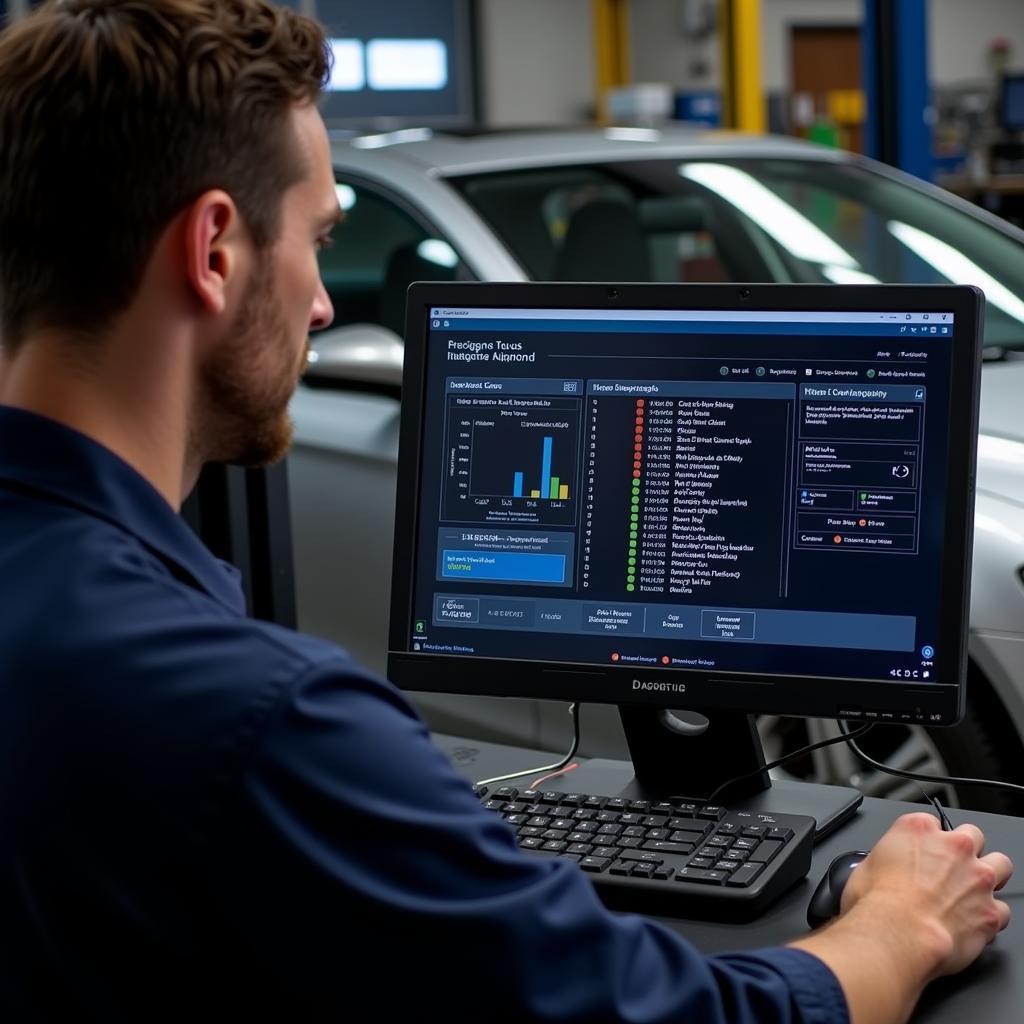A diagnostic car test, also known as a car diagnostic scan, is an essential tool used to pinpoint issues within a vehicle’s various systems. By plugging into the car’s onboard computer, the test reads and interprets Diagnostic Trouble Codes (DTCs) to reveal potential problems. But What Does A Diagnostic Car Test Show exactly?
This comprehensive guide delves into the depths of car diagnostic tests, explaining their significance, the information they provide, and how they benefit car owners and mechanics alike.
Unraveling the Mysteries: Understanding Diagnostic Trouble Codes (DTCs)
At the heart of a diagnostic car test are DTCs, which are alphanumeric codes stored in the vehicle’s computer. These codes act like digital breadcrumbs, leading mechanics to the source of a problem. Each code corresponds to a specific malfunction or area requiring attention.
For instance, a code like “P0301” signifies a misfire in cylinder 1, providing a valuable starting point for diagnosis. However, it’s crucial to remember that DTCs are indicators, not definitive diagnoses.
Deciphering the Data: What Does a Diagnostic Car Test Show?
A diagnostic car test can reveal a wealth of information about your car’s health, spanning across various systems. Here’s a glimpse into the key areas covered:
-
Engine Performance: This is often the primary focus of a diagnostic test. It checks for issues related to fuel and air mixture, ignition timing, emissions, and overall engine function.
-
Transmission System: The test assesses the transmission’s performance, including gear shifting, clutch operation (in manual cars), and fluid pressure.
-
Braking System: Diagnostic tests can identify problems with the Anti-lock Braking System (ABS), Electronic Stability Control (ESC), and other braking components.
-
Emissions System: This is crucial for ensuring your vehicle meets environmental regulations. The test analyzes the performance of the catalytic converter, oxygen sensors, and other emissions-related components.
-
Safety Restraint Systems: Modern vehicles are equipped with sophisticated safety systems. A diagnostic test can detect issues with airbags, seatbelt pretensioners, and other safety features.
 Diagnostic Car Test Engine Check
Diagnostic Car Test Engine Check
Benefits of a Diagnostic Car Test: Clarity and Confidence
Diagnostic car tests offer numerous benefits for both car owners and mechanics:
-
Early Detection: By identifying issues in their early stages, you can prevent minor problems from escalating into costly repairs.
-
Accurate Diagnosis: Diagnostic tests eliminate guesswork and provide mechanics with specific data, enabling faster and more accurate repairs.
-
Cost Savings: By pinpointing the root cause of a problem, diagnostic tests prevent unnecessary part replacements and labor costs.
-
Improved Performance: Addressing issues revealed by the test can optimize your car’s performance, fuel efficiency, and overall driving experience.
-
Increased Resale Value: A clean bill of health from a diagnostic test can boost your car’s resale value by assuring potential buyers of its condition.
How Long Does a Diagnostic Car Test Take?
The duration of a diagnostic car test can vary depending on the complexity of the issue and the specific tools used. Generally, a basic scan can take anywhere from how long does a car diagnostics test take to an hour.
Common Scenarios: When to Consider a Diagnostic Car Test
Several warning signs indicate the need for a diagnostic car test. If you experience any of the following, it’s advisable to seek professional assistance:
-
Illuminated Check Engine Light: This is often the first and most obvious sign of a potential issue requiring a diagnostic scan.
-
Unusual Noises: Grinding, squealing, knocking, or any unfamiliar sounds emanating from your car warrant further investigation.
-
Performance Issues: Decreased fuel efficiency, sluggish acceleration, rough idling, or difficulty starting the engine are all red flags.
-
Emissions Test Failure: If your car fails an emissions test, a diagnostic scan can pinpoint the cause and guide repairs.
 Mechanic Analyzing Diagnostic Results
Mechanic Analyzing Diagnostic Results
Beyond the Basics: Advanced Diagnostic Capabilities
While basic diagnostic tests are highly effective, advanced options are available for complex issues. These include:
-
Live Data Monitoring: This allows mechanics to observe real-time data from various sensors while the car is running, aiding in diagnosing intermittent problems.
-
Actuator Tests: These tests activate specific components like solenoids, injectors, or motors to assess their functionality.
-
ECU Programming and Coding: In some cases, a diagnostic tool can be used to reprogram or update the car’s Engine Control Unit (ECU) software.
Expert Insight: The Value of Professional Diagnostics
“A diagnostic car test is like taking your car’s pulse,” says automotive expert John Miller. “It provides vital information that helps us diagnose and treat problems efficiently, saving car owners time and money in the long run.”
Conclusion: Empowering Car Owners with Knowledge
Understanding what a diagnostic car test shows empowers car owners to make informed decisions about their vehicles. By embracing this technology, you can ensure your car remains reliable, safe, and operating at its peak performance. Remember, regular diagnostic tests are a valuable investment in your car’s longevity and your peace of mind.
FAQs
1. Can I perform a diagnostic car test myself?
While DIY diagnostic tools are available, it’s generally recommended to consult a qualified mechanic for accurate interpretation and diagnosis.
2. How often should I get a diagnostic car test?
It’s advisable to get a diagnostic car test annually or whenever you experience unusual car behavior.
3. Will a diagnostic car test drain my car battery?
No, diagnostic car tests consume minimal battery power.
4. Can a diagnostic car test tell me if my car needs an oil change?
While a diagnostic test can’t directly assess oil quality, it may indicate engine performance issues related to lubrication.
5. Are diagnostic car tests covered under warranty?
Warranty coverage for diagnostic tests varies depending on the vehicle manufacturer and warranty terms.
6. What is the difference between a code reader and a diagnostic scanner?
Code readers only display DTCs, while diagnostic scanners offer more advanced features like live data monitoring and actuator tests.
7. Can a diagnostic car test reset the check engine light?
Yes, a diagnostic scan can be used to clear DTCs and reset the check engine light after repairs have been made.
Need Further Assistance?
For personalized support and expert guidance on your car diagnostic needs, contact us via WhatsApp: +1(641)206-8880 or Email: [email protected]. Our dedicated team is available 24/7 to assist you.

Leave a Reply